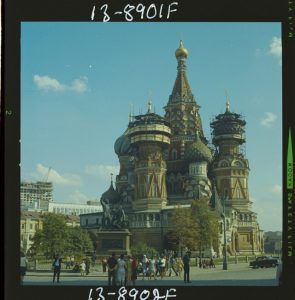by Ash Kaul
Autumn opened with Prime Minister Indira Gandhi asking for sweeping new powers. Daadi, my paternal grandmother, followed her hawk nosed twin with the same charade. Daadi’s Kashmiri nose, complexion and Kashmiri blood was the least she shared with Mrs. Gandhi. And though I would have loved to inherit Mrs. Gandhi’s patrician nose and covetable complexion, I was denied both. Lamentably, all I shared with Mrs. Gandhi was her performance that year. And so, like her, I too threw my weight around in the foreign policy subject of school—English, having performed worryingly in most others. In sports, I was in an insignificant division since my build was small for a fifth grader. Moreover, unlike Bombay with its packed high-rises, where we lived previously, the children here in Allahabad town thrived in its open spaces, while I still ran to reach the water tank first, but only in my division. And if we started the dash at the far end, I never ever came first. Bhai, my brother, elder to me by seven years, was right. I would have to specialize in only the External Affairs portfolio for now. Prime ministers need to be versatile, else risk performing like Mrs. Indira Gandhi.
But the advantages of being a ruler are obvious. While in October end, Indira Gandhi suspended elections to the Lower House, I could neither postpone the Class 5 exams nor the sports day. On November 5th, as the Lower House voted to extend its life, I on the other hand, had to put an end to athletic evenings. On the evenings of Monday, Wednesday and Friday, I struggled with Mr. Thomas my tutor, who taught me painful subject and patriotic ‘mother tongue’ Hindi, in the middle of a state that spoke only that, unlike Hindi-hating Bombay. After this painful tuition, I found relief in the Badminton court in front of pretty Beena’s house, where she and I would reach immediately after respective tuitions. And on the evenings of Tuesday, Thursday and Saturday, in my Mathematics tuition, I blinked keenly at my stirringly beautiful tutor Shirley McFarlane, my mind anywhere but on math. She taught. I watched.
Sometimes I’d hear my parents’ raised voices behind closed doors, and guess it to be something to do with who was more responsible for my academic deficiencies. Soon the door would fling open and they would emerge flushed, my father stomping ahead, shaking his head, with my mother following slowly, her counterfeit calm, an immediate giveaway. Walking fast to the refrigerator, my father would pull out a cold-water jug roughly. Soon, nursing a glass of whisky, hitching his pajamas, whistling through his teeth, he would tear Indira Gandhi—possibly culpable for even my non-performance—to shreds while Mother shot glances in my direction and changed the topic to matters domestic.
Bhai couldn’t care less. News and politics was all he cared about.
Now US Viking has sent back pictures of Mars and he is effusive.
“Instead of imagining answers based on tribal rubbish like spirituality, humanity is better served through Scientific Inquiry,” he says. “We know about Mars not because we sat eyes closed with our rumps on a glacier, but because we ventured. Jimmy Carter may not be sensational, but Maturity is characterized by quietude. It abhors sensationalism.”
So, had I not been sensational in Hindi and Mathematics, would I have then been mature?
But Bhai had only begun. And I am everybody’s captive audience.
“The Chinese leadership is dead. See, Mao Zedong has climbed the Chinese stairway to heaven and so has their Premier, whatever he is called. A crisis looms large.”
He looked at the sky, as though mandated to sort it all out.
“I think US Viking has caused an eclipse. You know, whenever excesses happen, dramatic change results. Pakistan is festering under Bhutto. And Mao had formed too many cliques for his own good. Now with him gone, they’re in for trouble. And as for Indira Gandhi, she has Nixon to thank for the curse of recurrence. Twins, they are. Just wait and see.”
I didn’t have to wait long.
As the pleasant emcee at the Services Cub announced in Tambola, ‘Nearer to heaven at seventy-seven’, the day I won my first Jaldi-Five, Bhai reported the many happening of that heavenly year, eclipsed as it was, by American Science. Deng Xiaoping (the right spelling is in Chinese only—Bhai told me when I doubted his) became the Premier and the ‘Gang of four’ including Mao’s wife, was expelled. An Apple II personal computer furthered science, quietly. And a bitter General, with a paltry anhydrous moustache, desiccated facial derma, and with funereal circles around his hooded caved-in eyes, brazenly seized power. Pakistan came under martial law.
Back home, soon after Morarjee Desai and other opposition leaders were released from jail and the lower house of Parliament dissolved, my spoilt cousin Bharat, named after the country, was given the freedom to study at will since my indulgent Daadi started trusting misplaced reports that he was now conscientious at school. Now, while media was routinely surprised at Mrs. Gandhi turning a Nelson’s eye to her spoilt son Sanjay Gandhi’s frequent bloopers, it didn’t surprise Bhai. Around that time, a gaggle of opposition parties salient among which were Congress Sangathan, Jan Sangh, Bhartiya Lokdal and Samajwadi Party, breakaways and splinters from this and that, merged to form the Janata party. Political opportunism now crackled in the air. A hoggish opposition was waiting to fill the vacuum. Sniffing opportunity in the musky political air, Jagjivan Ram, a loyal congressman, resigned in protest of the Emergency—“rather late, don’t you think?” Bhai observed—causing a split in the Congress. When the Emergency laws got cancelled in February, the 6th General elections drew close.
Bhai resorted to ceaseless reporting as though compensating for the reprehensible press censorship during Emergency.
On March 20th 1977, the elections ended. It was the first time the Indian National Congress lost despite hectic campaigning by its shrill campaigner in her melodramatic voice. The Janata party and allies gained an absolute majority. “Daadi,” proclaimed Bhai, (cleverly borrowing from history to predict family fortunes and vice versa) “will feel increasingly isolated now.” For him, “Daadi is a protoplasmic crystal ball of Indian politics so Kanpur, holds the key to parliament. That’s why I watch both like a hawk,” he said. Admittedly Bhai’s marks in History alone surpassed my combined marks in Hindi and Mathematics.
On March 24th, Bharat pissed into an empty cola bottle that had floated down the Ganges reaching Moti Jheel, Kanpur town’s modest attempt at carving an Indo-Gangetic Riviera. A gleefully peeing Bharat was caught by Baba, my paternal grandfather—the sole beast of burden for the family’s sins in Kali Yug—who was rumored to have asked him exactly 81 times, “But why piss, of all things?” Aptly, right then, Morarjee Desai was sworn in as Prime Minister at a healthy pee-drinking eighty-one. “Yes, it’s no fiction,” confirmed Bhai. ‘This eighty-one year old PM drinks piss’. Bhai explained that ‘PM’ now stands for ‘Piss Minister’ and the India of today—Hindustan or Bharat—is cousin Bharat in flesh and blood.
Talking of bottles, legend has it, said Bhai, that George the giant killer—social activist and trade unionist George Fernandes—was sighted angrily flushing a bottle of cola in the commode at the exact same time. Coca-Cola had just entered socialist India, and exited as swiftly. Because in those capitalism-abhorring times, MNCs were reminiscent of the East India Company that had craftily transfigured into the British Empire while the Mughals were watching natch-girls’ performances, and the Rajputs were busy losing to them and to each other. So, George, the giant killer inferred, that if Socialism is Left, then Cola must be Right, and if Cola is Right, then it must remain in the North, for the North is Right and the South is Left. Poor old George was always a simple soul. Even he was surprised when the electorate blew him up larger than life. Coming back to that day—the day George sank the inexplicably famous cola—the ban on the Hindu fundamentalist RSS (Modi’s, and Gandhi’s assassin’s finishing school) and twenty-six other organizations was lifted. No wonder Bharat was once again allowed to go to Moti Jheel. That was also the day Bhai my socialist brother, who saw right wing nationalism ‘as an uncooked skunk served in the middle of a fragrant dinner’, introduced me to the concept of Kali Yuga, the foredoomed period of plummeting moral standards, from which there is no escape. “The age is fucked, my dear,” he spat. Even though I nodded piously to big brother’s righteous idealism, privately, I cringed, because it mirrored some of my own jobbery.
Two days later Morarjee formed the cabinet with a bunch of malingerers and Bharat forged bonds with neighborhood loafers. And at the Delhi Press Club, renowned for its multitudinous fiction bolstered by ochroid ethanol, the gossip went that when cabinet colleagues went in the scorching Delhi heat to look up the PM at home, each left the proffered glass of nimbupaani lemon juice untouched. “The similarity with Bharat thankfully ended there,” Bhai noted with exaggerated relief. “But,” he added, “do you know what was Bharat’s typical Right Wing whataboutism to Baba’s ‘why piss of all things?’ He said: Millions pee into the sacred Ganges. I at least, peed into a bottle and then put that into the Ganges.”
In April, when nine Congress states were placed under President’s Rule, Bhai’s significant contribution was: “Hmmm.” It was also the time my father hummed every song out of tune, roughly in the tune of the national anthem, which also, was invariably out of tune.
In the month of May, the Janata party was established. A man with a scraggy chalky stubble and the name Chandra Shekhar, was chosen its President. Bhai struggled to liken this man with someone in our family. I merely smiled. Because I didn’t dare comment on the light adolescent hair that had started appearing on Bhai’s face! But unlike Bhai, who spoke in the Queen’s English, Chandra Shekhar spoke English in Hindi, like many of my classmates in the fiercely vernacular state of Uttar Pradesh. This was when Bombay educated Father Kutlow, our convent school Principal, started becoming somewhat hard of hearing. And when my aunt, Dadi’s daughter-in-law, who was partly deaf, started hearing again. But she became sadder, rather than happier. Because when she regained her hearing, she’d kept the good news to herself; and her backbiting mother-in-law was not aware of the changed auditory situation, so . . .
But now Bhai was bored with the same dramatis personae. Which is why I think, he widened the ambit of his study of recurrent events and twin personalities.
After Indira Gandhi’s defeat, he told me, Mama, my maternal grandmother, who was given to sneezing upon hearing untruth, stopped sneezing altogether. But as Morarjee Desai took oath, he said, she sneezed gently and then went to the toilet to relieve herself. As regards Papa, my idealistic maternal grandfather and fan of the good old times, especially the swinging sixties, he started writing protest letters about the state of affairs to editors of different newspapers. But because of press censorship during Emergency, they all lay unpublished. Now when Morarjee took office, all his letters were published in quick succession. And he came to be exalted as ‘an expert commentator on the Emergency’. Interestingly, this coincided with the time when many Indian politicians who went to jail, confused themselves for freedom fighters, when the fact of the matter was, that had they known Indira Gandhi would jail them, they might have hidden somewhere.
But all these recurrences were a piffling.
On November 5th, a leader from the communal Jan Sangh party, with a face as square as mine, skin not fair not swarthy just like mine, and with knees sticking out (sadly, like mine) from a crisp dhoti, stood to deliver a speech. This was the new External Affairs Minister of India. He addressed the UN General Assembly—where only six people (all from Uttar Pradesh) besides him understood Hindi—in Hindi. Bhai explained it interestingly: “Hyper-nationalism is crucial for right wingers because otherwise their economic agenda is indefensible.” To tease me, Bhai wondered with a wink, about who was my mirrored personality in the political world. I said nothing but a shiver went up my liberal Kashmiri spine. As Atal Bihari Vajpayee delivered his Hindi elocution with his idiosyncratic vacuity, to a foreign audience where only 7 people spoke Hindi, I stared at the marks of my first Hindi test. Matching Vajpayee’s protracted chasms of sheer silence in speech, I had a yawning deficit of 93%; in other words, a grossly underperforming 7%. Excusable in part because it was after we’d moved from an English venerating Bombay to a vehemently vernacular Allahabad. Still, my father’s eyebrows flew into the ceiling fan and Mother ‘had a word’ with Mr. Thomas. “In explicit Hindi, not implicit English,” offered Bhai. Subsequently she asked me with a new wrinkle on her brow, how I found Mr. Thomas. Then she suggested I cut one tuition class every week with Shirley McFarlane, and add one with Mr. Thomas instead. But I reasoned—my mind on Shirley’s long legs and dreamy low-cut blouses—that with better marks in Mathematics, I would cut my losses in Hindi. It had to be the 1977 archetype of democracy, when I exercised my Right to Self-Determination to underline my own bleak future. But I quaked as a thought crashed into my head: does this self-same me with Sanjay Gandhi?
On that note, in those years of nasbandi—Sanjay Gandhi’s notorious, forced vasectomy program during Emergency—a small change had entered adolescent anatomy, a change that my best friend Sanjay Kumar and our other friends were puzzled about en masse. We were wondering about a clutch of helicoid hair that had started to spring around that private part of our respective bodies—that sequestered nether region that Indira Gandhi’s son had assailed publicly with catastrophic consequences. We budding scientists were flummoxed about this organic cryptogram that had breached our school-boy shorts. That’s because even though an imperiously adolescent Indira’s India had forced sterilization on many an unsuspecting vas deferens, it had gamely omitted timely sex education. And so, it took this alchemistic starchy patch in the pajamas the next morning to mark the end of the Emergency. Now when ‘Scientific Inquiry’ resumed at school, finally, the poser in the pajamas, was resolved. But it had to bide its time. Because when night-fall afflicts vernacularly afflicted sex education-less school boys, the pun in the English phrase whirs past inconspicuously. To become apparent, it must wait for the onset of spring in the phonetically dreadful and impossibly scientific ‘Sun Sattattar’ (Sun = year, + Sattattar = ’77 in Hindi), in a spectacularly vernacular Allahabad.
And when it finally does, I sigh.
Not out of relief, but in frustration.
That it was I who ejaculated to end the Emergency and yet again, the hawk nose took the credit. But Bhai doubles the stakes and robs me of sleep when he wonders: “What if it is the other way round!”
Ash Kaul is a Kashmiri writer and poet. He contributes a political satire column in LITRO and enjoys writing historical fiction. He is giving final touches to a historical epic and to a literary historical set in the conflict zone of Kashmir. He lives in India with his wife and daughter. He can be contacted at laughing ashes(at)gmail(dot)com.





Be First to Comment